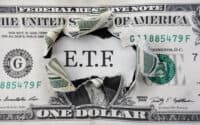
Being a short seller always has been a risky proposition, because of the unlimited loss potential. For investors that buy and are long stocks, or any other financial instrument, the worst case scenario is that a position can go to zero from its purchase point. For the short seller, there is no downside limit like that, and the potential for losses can be bottomless.
[in-text-ad]
A recent Jefferies research report on hedge fund holdings from Steven DeSanctis and his team offers some good insight into the positioning at the major funds. The report noted this when discussing the long versus short tug-of-war:
Long-only investors have seemed to get the upper hand of late, as those names that are Short by Hedge Funds but “crowded” by Long-only investors have rebounded sharply from the low. Also, the S&P 500 has risen 44% from the March low, and thus it is very hard to be Net Short anything and thus names that are Short or moved into that position, have jumped. We do think that the market is range bound, thus we will see differentiation between stocks and shorting names will make a comeback.
The five biggest hedge fund short positions probably will not surprise market veterans and savvy traders as some have run incredibly hard and have worn out those betting on a big downside move.
AT&T
This is a top telecom and entertainment play. AT&T Inc. (NYSE: T) is the largest U.S. telecom company and provides wireless and wireline service to retail, enterprise and wholesale customers. The company’s wireless network serves approximately 124 million mobile connections, with 77 million postpaid subscribers.
While AT&T’s traditional wireline voice business has undergone a period of secular decline due to wireless substitution and cable competition, the company through WarnerMedia has become a diversified media and entertainment business.
The company said back in May it would immediately abandon Venezuela’s pay-TV market as U.S. sanctions prohibit its DirecTV platform from broadcasting channels that the socialist administration of Nicolas Maduro required it to carry. AT&T is the largest player in Venezuela’s pay-TV market and was one of the last major American companies still operating in the crisis-wracked country.
The theme for AT&T short-sellers for years has been the company’s massive load of debt, and some of that has been unwound through spin-offs and sales. AT&T already held a heavy debt load, holding more than $150 billion in debt at the end of 2019. It entered into a $5.5 billion term loan agreement in May to give it “financial flexibility” amid the pandemic, which once again, added to the debt.
Investors receive a 6.97% dividend, which short-sellers are responsible for when shorting the shares. The consensus price target across Wall Street is $32.50. AT&T stock closed trading on Friday below that level at $29.58.
Exxon
The energy giant is trading at levels that are higher than the March lows, but short sellers have stood their ground. Exxon Mobil Corp. (NYSE: XOM) is the world’s largest international integrated oil and gas company. It explores for and produces crude oil and natural gas in the United States, Canada, South America, Europe, Africa and elsewhere.
Exxon also manufactures and markets commodity petrochemicals, including olefins, aromatics, polyethylene and polypropylene plastics, and specialty products, and it transports and sells crude oil, natural gas and petroleum products.
This was an outstanding short earlier in the year, especially when oil futures cratered to literally below zero, but one would think hedge funds are keeping a close eye on this position because if the economy opens up even some, the benchmark price could go back above the $50 level or higher.
Investors receive an 8.27% dividend, which probably will continue to be defended and short sellers have to pay. The consensus target is $47.38. Exxon Mobil stock closed at $42.08 on Friday.
IBM
Short sellers are probably closely studying this blue-chip giant after it posted the best quarters for earnings in years. International Business Machines Corp. (NYSE: IBM) is a leading provider of enterprise solutions, offering a broad portfolio of information technology (IT) hardware, business and IT services, and a full suite of software solutions. The company integrates its hardware products with its software and services offerings in order to provide high-value solutions.
[in-text-ad]
IBM’s five major segments are: 1) Cognitive Solutions, 2) Global Business Services, 3) Technology Services & Cloud Platforms, 4) Systems and 5) Global Financing. Analysts cite the company’s potential in the public cloud as a reason for their positive outlook going forward. But note that IBM is among the big corporations with the most debt.
The company’s adjusted second-quarter earnings fell 31% but beat analysts’ expectations. The company’s revenue declined year over year for the second quarter in a row, with coronavirus playing a role across multiple business lines. Overall, it was a solid report, and some of the short sellers may think about closing positions.
Holders of IBM stock receive a 5.3%% dividend. The consensus target is $138.56, and the shares were last seen at $122.94.
Tesla
This has been one of the most talked-about companies over the past two years and a short seller’s nightmare. Tesla Inc. (NASDAQ: TSLA) manufactures and sells electric vehicles, particularly its high-end Model S and X, as well as the mass-market-oriented Model 3. It makes some of America’s most eco-friendly cars.
Tesla also generates revenue from selling zero-emission vehicle credits to original equipment manufacturers, installing, operating and selling solar energy systems (previously SolarCity), and manufacturing and selling energy storage systems to customers.
The stock has been on a huge short-squeeze-driven run, and CEO Elon Musk is unpredictable as well. The numbers keep rolling in and the stock keeps going higher. Tesla reported its first full year of GAAP profits last week, along with second-quarter results. During the period ending June 30, 2020, the electric car company grappled with the effects of the COVID-19 pandemic on its U.S. employees and factory operations, especially. Tesla said its revenue reached $6.04 billion during the quarter, with $428 million of that from regulatory credits.
Shorting Tesla stock is kind of like shorting bitcoin. The potential for a victory is huge, but so is the risk potential. The $1,202.67 consensus price is well below the most recent close at $1430.76.
Trade Desk
This stock had a red-hot initial public offering (IPO) in 2016 and has been steadily moving higher ever since. Any aggressive sell-off would offer aggressive short sellers a way to cover some shares. Trade Desk Inc. (NASDAQ: TTD) provides a self-service omnichannel software platform that enables clients to purchase and manage data-driven digital advertising campaigns in the United States and internationally.
The company’s platform allows clients to manage integrated advertising campaigns in various advertising channels and formats, including connected TV, mobile, video, audio, display, social and native on various devices, such as smart TVs, computers and mobile phones and tablets.
The stock has been on a huge roll and trades at a massive 176 price-to-earnings (P/E) ratio. However, with earnings expected this week, the shorts may press their trades in hopes of a miss or bad forward guidance. Given the massive increase in digital advertising, this could prove interesting.
The consensus price objective of $336.76 is well below the Friday closing price of $451.33 a share.
Short selling is an extremely difficult game, and while it would have been incredible to have been short a sizable position prior to the February to March 35% meltdown in less than 30 days, the 44% rally off the lows has taken away those gains and perhaps more, if hedge funds pressed their bets at the lows.
Get Ready To Retire (Sponsored)
Start by taking a quick retirement quiz from SmartAsset that will match you with up to 3 financial advisors that serve your area and beyond in 5 minutes, or less.
Each advisor has been vetted by SmartAsset and is held to a fiduciary standard to act in your best interests.
Here’s how it works:
1. Answer SmartAsset advisor match quiz
2. Review your pre-screened matches at your leisure. Check out the advisors’ profiles.
3. Speak with advisors at no cost to you. Have an introductory call on the phone or introduction in person and choose whom to work with in the future
Get started right here.
Thank you for reading! Have some feedback for us?
Contact the 24/7 Wall St. editorial team.
 24/7 Wall St.
24/7 Wall St. 24/7 Wall St.
24/7 Wall St.

